Johor ruler Sultan Ibrahim sworn in as Malaysia's 17th king; monarch’s evolving role raises hopes over diplomacy, unity
The 65-year-old monarch was installed as Malaysia’s Yang di-Pertuan Agong in a lavish ceremony at the national palace.
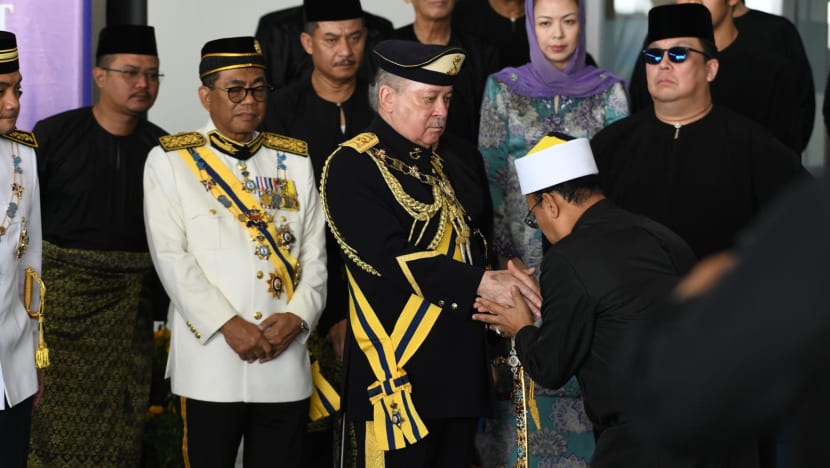
Malaysia’s 17th King Sultan Ibrahim Sultan Iskandar at a sending-off ceremony before departing from Johor to the Istana Negara on Jan 31, 2024. (Photo: Department of Information Malaysia)

This audio is generated by an AI tool.
JOHOR BAHRU/KUALA LUMPUR: Johor ruler Sultan Ibrahim Sultan Iskandar was installed on Wednesday (Jan 31) as Malaysia’s 17th king, the first time he is holding the post and more than 34 years after his father’s reign.
Thousands of people thronged the streets in Johor Bahru and Kuala Lumpur to bid farewell and welcome him respectively, as the 65-year-old's appointment raised hopes that he would bring about positive change in the economy, diplomacy and national unity.
The monarch took the oath of office at the national palace in Kuala Lumpur slightly before noon, in an opulent ceremony steeped in centuries of tradition.
Sultan Ibrahim was decked in the black uniform of the Johor Military Force.
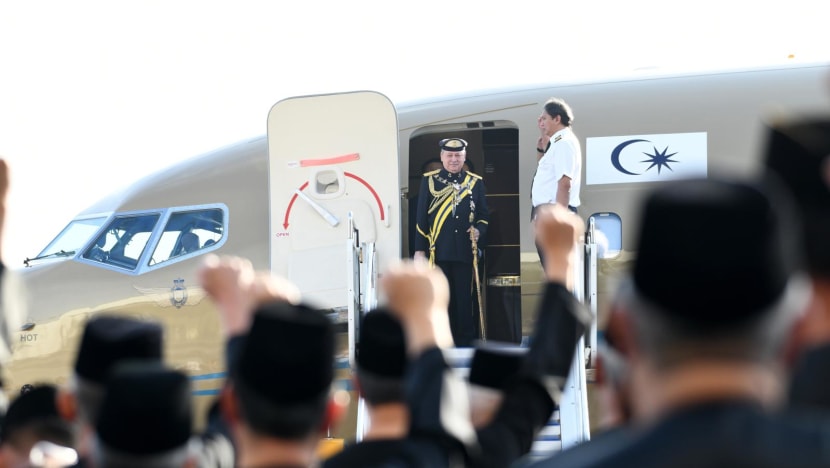
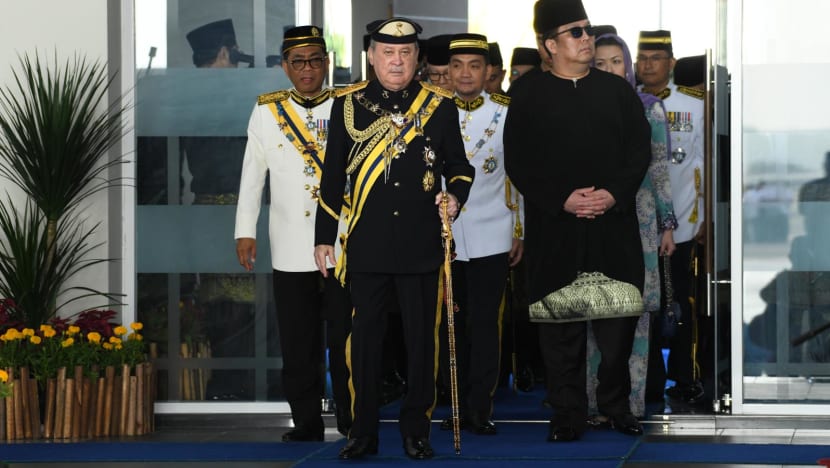
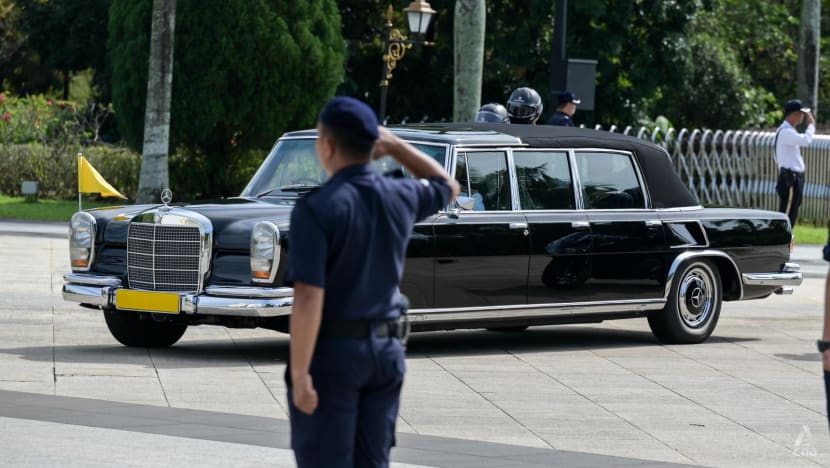
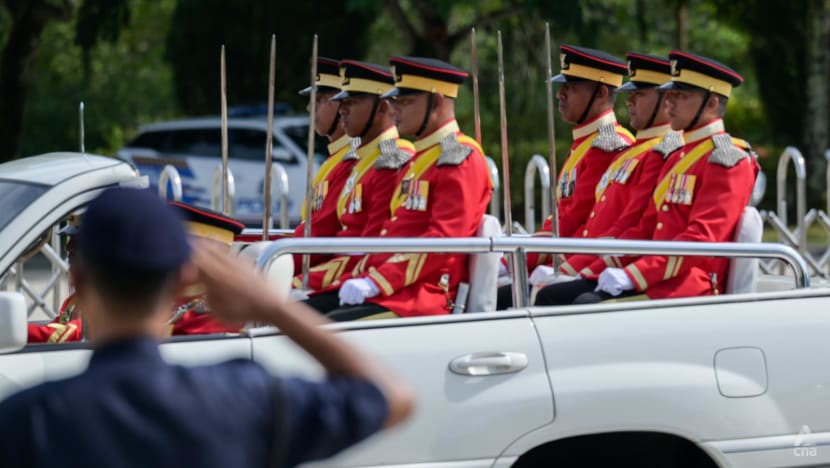
In front of a congregation of hundreds of guests, including Prime Minister Anwar Ibrahim, Sultan Ibrahim signed the letter of appointment before he was officially proclaimed Yang di-Pertuan Agong, or Supreme Ruler, for the next five years.
Sultan Ibrahim was elected king in October 2023, after the country’s nine sultans met at the Conference of Rulers.
The decision follows the established order of Malaysia’s unique rotational monarch system in which the country’s nine rulers take turns to be the king for five-year cycles.
The term for his predecessor, Pahang ruler Al-Sultan Abdullah Ri'ayatuddin Al-Mustafa Billah Shah, ended on Jan 30.
The Sultan of Perak, Sultan Nazrin Shah, who was elected deputy king at October’s meeting, also took the oath of office on Wednesday.
ROYAL SEND OFF FROM JOHOREANS
Sultan Ibrahim commenced his journey from Bukit Serene Palace in Johor Bahru to the national palace in Kuala Lumpur at around 7.45am.
Thousands of Johoreans lined the streets as his motorcade left the palace gates and travelled 24 km towards Senai Airport.
Many waved the Johor state flag and cheered “Daulat Tuanku” or “Long live the King” as the royal entourage passed along the stretch.
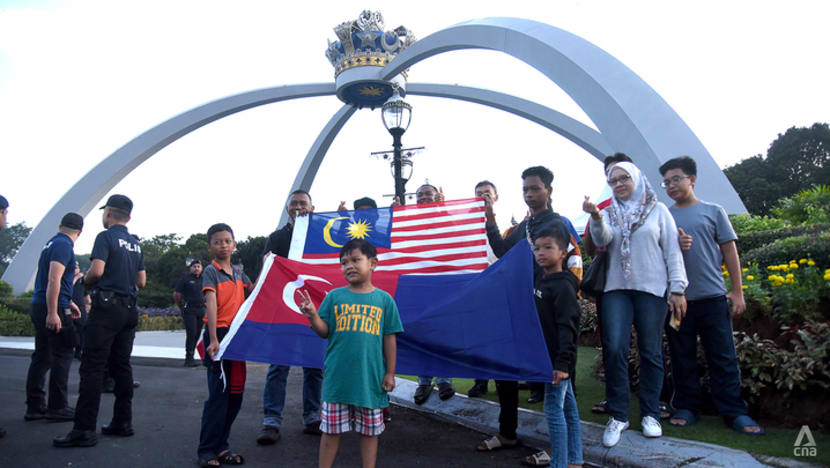
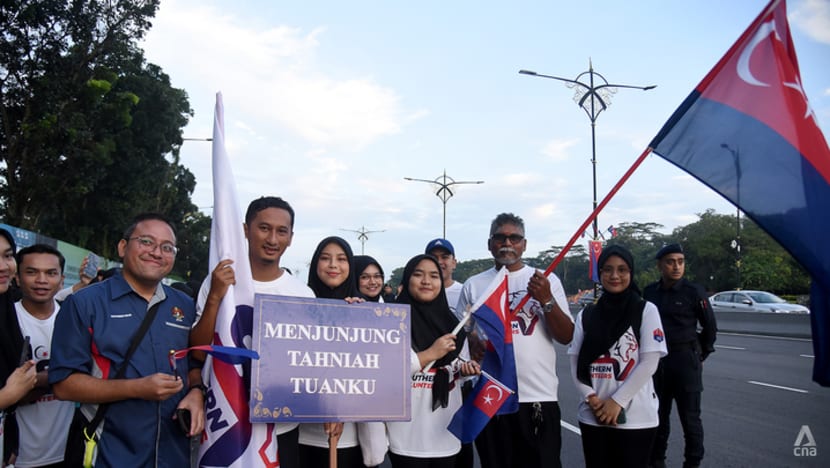

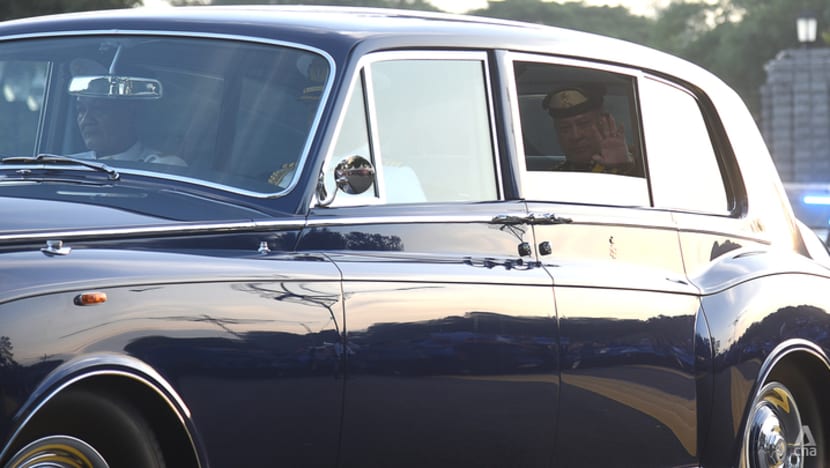
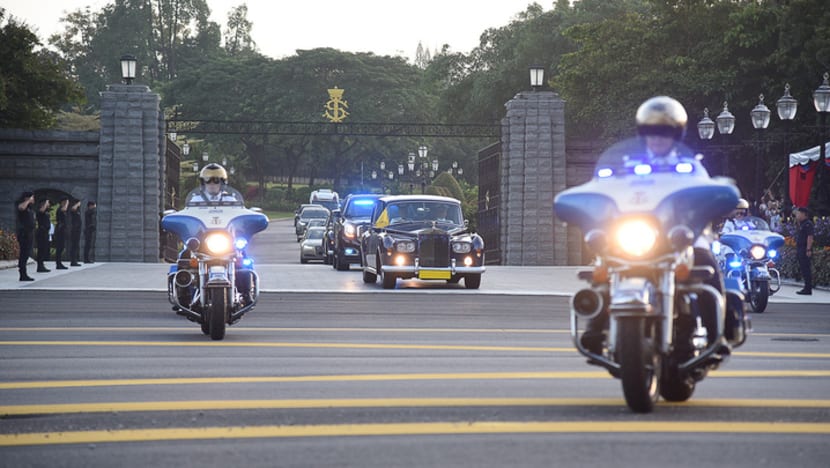
Among them was Nur Fatin Athikah Abdul Hisham who told CNA she wanted to send off Sultan Ibrahim because she wanted to be part of a “historical moment” for Johor and Malaysia.
The 23-year-old and around a hundred other fellow members of an activist group called Southern Volunteers had stood outside the palace gates since 7am.
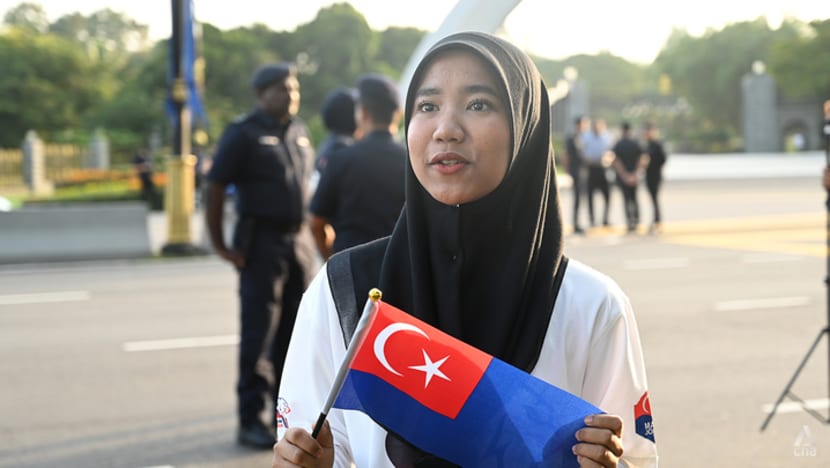
“We are part of the younger generation who have never seen our Johor Sultan become king, so this is a historical moment for us,” she added.
At Senai Airport, Sultan Ibrahim was greeted at the royal hangar by Johor Chief Minister Onn Hafiz Ghazi and Minister of Defence Khaled Nordin. The monarch then inspected a guard of honour by the Johor Military Force.
The monarch smiled as he waved and saluted at the crowd, consisting of hundreds of Johor-based politicians and civil servants, before boarding a private jet and departing his home state.
On arrival at the Royal Malaysia Air Force (RMAF) base in Subang, Selangor, Sultan Ibrahim was greeted by the Comptroller of the national palace and inspected a military guard of honour by the Air Force before heading towards the national palace.
Malaysians also thronged the roads outside the Istana Negara in Kuala Lumpur to catch a glimpse of their new king.
This included Mr Jawahar Ali Taib Khan, who owns a restaurant near the national palace.
“We believe that Tuanku (the king) will do wonders for the country. He is a very strict person. We hope the political parties will be more harmonious and the country’s economy will do much better,” said the 59-year-old man.
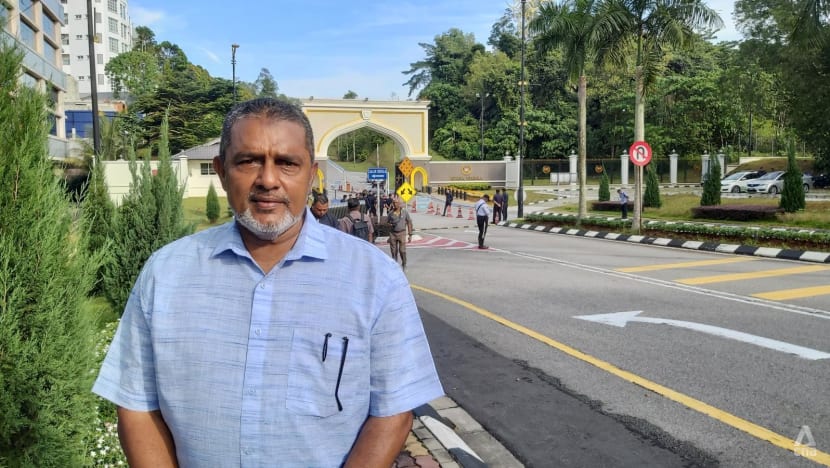
Mr Jawahar, who is from Sabak Bernam, Selangor, added that he believes Sultan Ibrahim is a ruler who is business-minded and open to ideas, and these values will help bring change to the country.
“We believe our politicians will follow the advice of Tuanku. As we can see during his rule in Johor, he is very firm but friendly at the same time,” he said.
Civil servant Noor Hassan Hashim, 40, who is from Putrajaya, was also seen near the palace gates. He believes that the swearing-in of a new king will always be a historic occasion.
“This happens only once in five years,” he said.
Mr Noor Hassan believes that Sultan Ibrahim will have a different set of challenges from his predecessor Sultan Abdullah, who ruled during the COVID-19 pandemic and a protracted political crisis.
“The old king steered us during the political crisis. And I believe the new king will now use his experience and knowledge to bring Malaysia to the next level,” he said.
OPTIMISM ON HIS REIGN
CNA spoke to some Malaysians before the swearing-in ceremony to get their thoughts on Sultan Ibrahim’s upcoming reign.
Mr Teh Kee Sin, advisor to the South Johor Small and Medium-sized enterprises (SME) Association, said that Sultan Ibrahim is a kind but firm ruler, and will likely take Malaysia to greater heights as head of state.
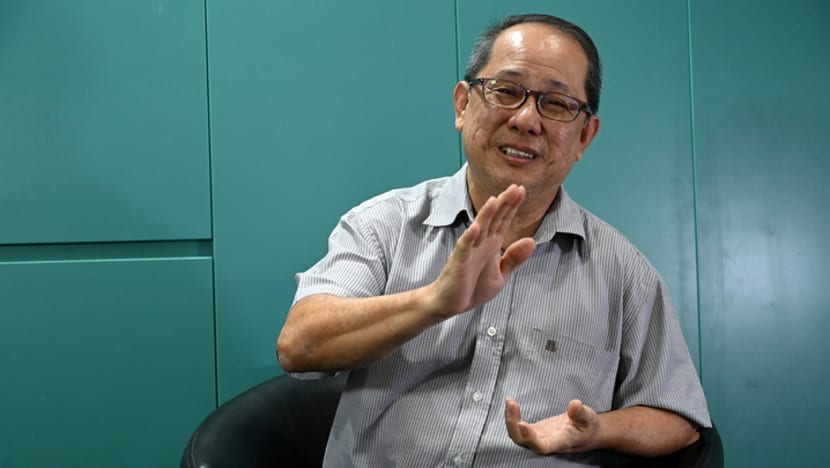
“On many occasions we have witnessed the Sultan (giving) a helping hand to people who are in need,” said Mr Teh, referring to how the ruler has charitably donated to flood victims as well as to the poor in the southern state.
“The sultan simply wants us to live comfortably. He wants us to live well,” added Mr Teh.
Mr Hussein Ibrahim, secretary of the Johor Indian Muslim Entrepreneurs Association (Perusim), told CNA that during Sultan Ibrahim’s 14-year reign as ruler of Johor, the monarch has emphasised the importance of harmony between the different races.
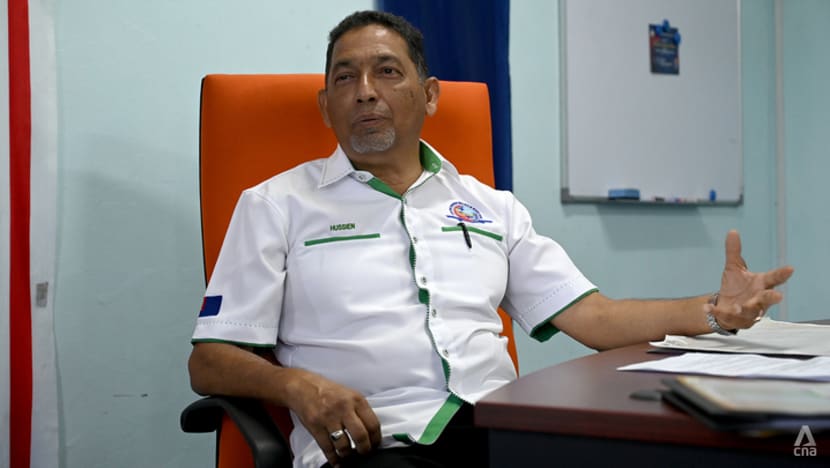
He noted that in recent times, the relationship between the different ethnic races in Malaysia has been tense, perpetuated by polarised political differences, and that the Johor Sultan will be the right person to unite the masses.
“Presently, we can see the relationship between the races are beginning to fracture,” said Mr Hussein.
“But I do believe that His Majesty will set it right to unite all people of Malaysia as one Bangsa Malaysia,” he added.
Mr Teh, the South Johor SME Association advisor, said Sultan Ibrahim could also improve Malaysia’s bilateral relations with some foreign countries through soft diplomacy, given his strong personal friendship with international world leaders.
“His Majesty … has very good international diplomatic connections, especially with Singapore,” said Mr Teh.
“We believe and we also hope that he can make Malaysia the choice to attract more foreign direct investments,” he added.
Political analyst Adib Zalkapli, director of public policy consulting firm BowerGroupAsia, told CNA the role of the monarch in Malaysia has evolved over the years.
He noted that previously, the king played a symbolic role as head of state. However, especially during the reign of Sultan Abdullah over the last five years, the king has been crucial in resolving political stalemates in Malaysia.
For instance, Sultan Abdullah played a key role in resolving the political impasse after the last 2022 general election ended in a hung parliament, when he appointed Anwar Ibrahim as prime minister to lead a unity government.
Mr Adib noted that Sultan Ibrahim’s outspoken style and willingness to lend advice in government matters means that the ruler would further shape the role of the monarchy.
“Sultan Ibrahim has always played a key role in the governance of the state. And I think with the expansion of the role of the Yang Di Pertuan Agong that we've seen over the last five years, it fits very well with Sultan Ibrahim’s character and style of ruling,” said Mr Adib.
“So it wouldn't be a big surprise to Malaysia in general to see a more assertive monarchy in the coming years.”



















